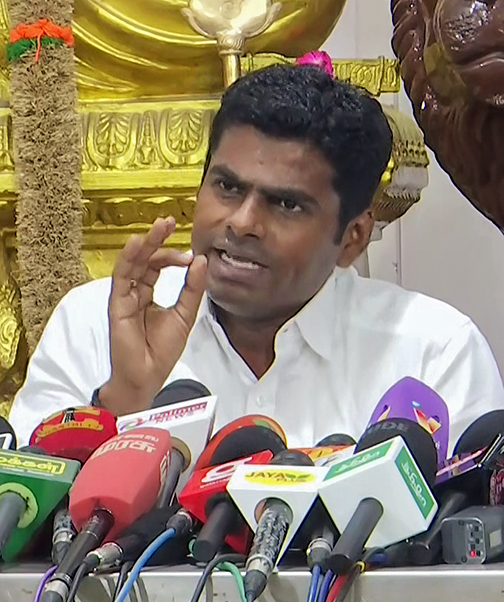Bengaluru
In a political earthquake that sent shockwaves across Tamil Nadu, the All India Anna Dravida Munnetra Kazhagam (AIADMK) announced its separation from the Bharatiya Janata Party and its exit from the ruling party-led National Democratic Alliance (NDA), effectively signalling its intention to forge a distinct path for the 2024 Lok Sabha elections alongside like-minded parties.
In essence, the AIADMK’s decision to exit the BJP-led NDA alliance is the result of a complex interplay of factors. While K. Annamalai’s actions and E. Palaniswami’s (EPS’) insecurity over a fellow Gounder’s (farming community) meteoric rise in Tamil Nadu politics were the immediate catalyst, long-standing resentment over criticism and policy differences between the two parties also contributed to the breakdown. As the AIADMK charts its course for the upcoming elections, the political landscape in Tamil Nadu promises to remain dynamic and intriguing.
While the AIADMK’s official resolution did not explicitly name individuals, it cited concerns about the recent actions of the BJP’s state leadership, which it deemed detrimental to the legacies of Dravidian stalwarts, the late C.N. Annadurai and late Chief Minister J. Jayalalithaa. Furthermore, the AIADMK expressed its dissatisfaction with the BJP’s criticism of the party’s policies.
Central to this discontent was the “abrasive” politics of BJP state president K. Annamalai. His assertive approach had irked the AIADMK, with his recent comments about former CM Annadurai causing a considerable uproar. Annamalai had claimed that Annadurai had made a contentious remark about Hinduism in 1956 during the Sanatan Dharma controversy. While the BJP leader insisted that he did not intend to disrespect the Dravidian stalwart, the AIADMK perceived his remarks as defamatory.
The AIADMK demanded an apology from Annamalai, but it was met with silence. In an attempt to address their concerns, senior AIADMK leaders met with BJP chief J.P. Nadda in New Delhi, where they raised issues about Annamalai’s “confrontational” style of politics and sought either his apology or replacement. However, the BJP’s central leadership chose to back Annamalai, ultimately leading to the AIADMK’s decision to sever ties.
While the Annamalai factor played a prominent role in the split, there are deeper undercurrents at play. The Tamil Nadu BJP’s consistent criticism of AIADMK’s policies and what has been perceived as the belittling of the party’s 20 August 2023 Madurai conference were sources of growing tension. This wasn’t an isolated incident but rather part of a pattern of AIADMK feeling slighted by its ally’s remarks over the past year.
Another contributing factor may be the BJP’s inclination to accommodate former Chief Minister O. Panneerselvam (OPS) within the alliance. The AIADMK’s unease with this development may have further exacerbated the rift.
Annamalai’s political journey began in 2020 when he joined the BJP, but it was in 2021 that he made his foray into Tamil Nadu’s political landscape by contesting the Assembly elections from Aravakurichi in western Tamil Nadu. Although he did not win the elections, Annamalai’s relentless presence in the headlines has cemented his status as a prominent political figure in a state historically dominated by the Dravida Munnetra Kazhagam (DMK) and the AIADMK. The BJP, with an eye on establishing its presence, has bet on Annamalai’s potential.
Curiously, the BJP’s national leadership has displayed little eagerness to rein in Annamalai, despite repeated appeals from the AIADMK. This has led to the perception that Annamalai enjoys unwavering trust and support from Prime Minister Narendra Modi and Home Minister Amit Shah. In response to the AIADMK’s announcement of ending the alliance, Annamalai has remained enigmatic, hinting at a forthcoming intervention from the national leadership.
The pivotal question now looms large: Is the BJP’s gamble to potentially forgo immediate electoral advantages in favour of a more profound, long-term strategy a wise decision? Is it prudent for the BJP to place such heavy reliance on Annamalai?
Annamalai’s youth, dynamism, non-conformist approach, and non-Brahmin identity all work in his favour. His unwavering stance on issues like the Sanatan Dharma controversy, where he boldly challenged the ruling DMK, has endeared him to the Rashtriya Swayamsevak Sangh. The BJP believes that this approach could potentially resonate with segments of society uncomfortable with the DMK’s perceived “anti-Hindu” stance.

